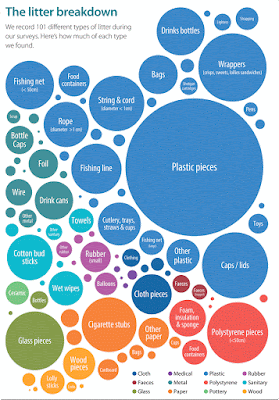What do bottle tops, starfish, plastic bags, shells, lolly sticks, pebbles, fishing nets, feathers, toys, crabs and lighters all have in common?
No, no idea?
Well what about starfish, shells, pebbles, feathers and crabs?
Beach! Of course they're all found on a beach! well actually you'll find all of them on a beach, and lots more besides.
Alright you're not a group of primary aged children but the message is just the same. This is a selection of some of the things found in last year's Great British Beach Clean, when a record breaking number of volunteers collected and recorded a whopping 273,747 pieces of litter.
You can read the full report here.
This year's beach clean is happening this weekend, if you've an hour or more to spare (and the tide's not in!! - see Meet Basil) check out which events are happening near you. If there isn't one it's too late to organise an official clean this weekend but you can still go down to the beach for a walk and you can still pick up a few items of litter as you go. Not only that but research from National Trust shows that a walk along the coast is exceptionally good for you, it makes you sleep longer and feel happier (read more here).
Find out more about the Beach Clean by MCS here.
Of course if we didn't create litter in the first place it would not be necessary, unfortunately not everything on the beach was originally dropped there, some of it has travelled a long way across oceans, some short distances blown into the sea from a litter bin on the prom (or up in town), some is debris from boats either accidentally or deliberately released into the water.
Find out more about the problems of coastal litter and marine pollution in the lead article, Tackling a tide of marine pollution by Marine Conservation Society in CJS Focus on Marine and Coastal Environments
Well what about starfish, shells, pebbles, feathers and crabs?
Beach! Of course they're all found on a beach! well actually you'll find all of them on a beach, and lots more besides.
Alright you're not a group of primary aged children but the message is just the same. This is a selection of some of the things found in last year's Great British Beach Clean, when a record breaking number of volunteers collected and recorded a whopping 273,747 pieces of litter.
You can read the full report here.
 |
| Litter breakdown from 2014 BeachClean (MCS) |
This year's beach clean is happening this weekend, if you've an hour or more to spare (and the tide's not in!! - see Meet Basil) check out which events are happening near you. If there isn't one it's too late to organise an official clean this weekend but you can still go down to the beach for a walk and you can still pick up a few items of litter as you go. Not only that but research from National Trust shows that a walk along the coast is exceptionally good for you, it makes you sleep longer and feel happier (read more here).
Find out more about the Beach Clean by MCS here.
Of course if we didn't create litter in the first place it would not be necessary, unfortunately not everything on the beach was originally dropped there, some of it has travelled a long way across oceans, some short distances blown into the sea from a litter bin on the prom (or up in town), some is debris from boats either accidentally or deliberately released into the water.
Find out more about the problems of coastal litter and marine pollution in the lead article, Tackling a tide of marine pollution by Marine Conservation Society in CJS Focus on Marine and Coastal Environments